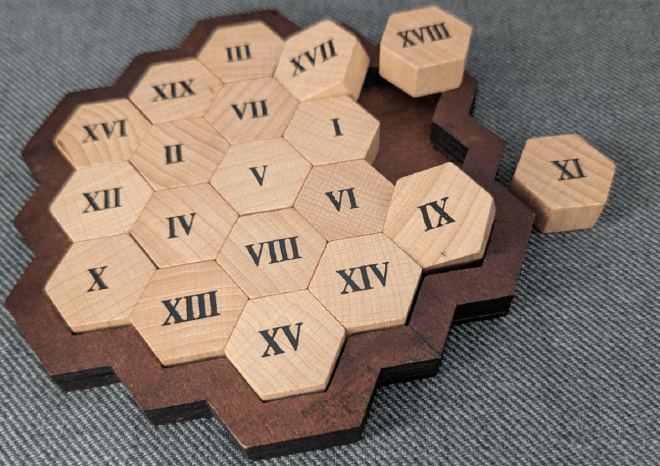FSharp Computation Expressions

Last year on my birthday I received a cool gift. A puzzle where 19 numbers (1 to 19) need to be arranged in an hexagon, so that all “lines” add up to 38.
I couldn’t solve it. It’s too hard for me. But as a programmer, I can build a program that solves it!
I started typing and the AI code completion agent did most of the work, using a (mostly) brute force algorithm. It solved the puzzle, but took too long. I wasn’t happy with it. I optimized it by modeling the solution after the “real” way I would solve it if I wasn’t so lazy.
In my model I have a “bag” with the numbers, and I take them one by one at random or the correct one if I know what it is. If the correct one is not in the bag then I know this solution is impossible and I have to backtrace to try another combination. It worked but the code was UGLY! A pyramid of doom callbacks!
Then I remembered about F# computation expressions and how they would probably be a perfect fit for this. I never developed CE before, so I tried to have the LLM do it for me. I mean I had read about them before, and tried to play with it, but it never clicked for me. The results were terrible. I couldn’t find an AI model that can deal well with CE.
Back to “hand coding” and reading the docs! I found a great set of posts about it. https://fsharpforfunandprofit.com/posts/computation-expressions-intro/
I love the result. Here it is
printfn @"ALL NUMBERS ARE DIFFERENT AND BETWEEN 1 AND 19
N00+N01+N02 = 38 N00
N02+N03+N04 = 38 N11 N01
N04+N05+N06 = 38 N10 N12 N02
N06+N07+N08 = 38 N17 N13
N08+N09+N10 = 38 N09 N18 N03
N10+N11+N00 = 38 N16 N14
N11+N12+N13+N03 = 38 N08 N15 N04
N01+N13+N14+N05 = 38 N07 N05
N03+N14+N15+N07 = 38 N06
N05+N15+N16+N09 = 38
N07+N16+N17+N11 = 38
N09+N17+N12+N01 = 38
N00+N12+N18+N15+N06 = N02+N13+N18+N16+N08 = N04+N14+N18+N17+N10 = 38"
type BagBuilder<'t>(items: 't list) =
let bag = System.Collections.Generic.HashSet<'t>(items)
// this is for the "let! x =" or other assignments like "use! x =". Just call the continuation
member this.Bind(x, f) = f x
// iterate the sequence. for each item, try to use
member this.For(sequence: 't seq, body: 't -> unit) : unit =
for i in sequence do this.Using(i, body)
// Using means removing from bag, calling the continuation and then putting it back
member this.Using(value: 't, body: 't -> unit) : unit =
if bag.Remove(value) then
body value
bag.Add(value) |> ignore
member this.Zero(x) = ()
printfn "Searching for solutions..."
let bag = BagBuilder([1..19])
let mutable solutions = []
bag {
for n1 in [1..19] do
for n2 in [1..19] do
use! n3 = 38 - n1 - n2
for n4 in [1..19] do
use! n5 = 38 - n3 - n4
for n6 in [1..19] do
use! n7 = 38 - n5 - n6
for n8 in [1..19] do
use! n9 = 38 - n7 - n8
for n10 in [1..19] do
use! n11 = 38 - n9 - n10
use! n12 = 38 - n11 - n1
for n13 in [1..19] do
use! n14 = 38 - n12 - n4 - n13
use! n15 = 38 - n2 - n14 - n6
use! n16 = 38 - n4 - n15 - n8
use! n17 = 38 - n6 - n16 - n10
use! n18 = 38 - n8 - n17 - n12
use! n19 = 38 - n15 - n5 - n18 - n11
solutions <- [|n1; n2; n3; n4; n5; n6; n7; n8; n9; n10; n11; n12; n13; n14; n15; n16; n17; n18; n19|] :: solutions
}
solutions
|> List.chunkBySize 2
|> List.iter (fun (solutions: int array list) ->
let render (s: int array) =
[|
(sprintf " %02d |" s.[0]);
(sprintf " %02d %02d |" s.[11] s.[1]);
(sprintf "%02d %02d %02d |" s.[10] s.[12] s.[2]);
(sprintf " %02d %02d |" s.[17] s.[13]);
(sprintf "%02d %02d %02d |" s.[9] s.[18] s.[3]);
(sprintf " %02d %02d |" s.[16] s.[14]);
(sprintf "%02d %02d %02d |" s.[8] s.[15] s.[4]);
(sprintf " %02d %02d |" s.[7] s.[5]);
(sprintf " %02d |" s.[6]);
|]
let visualizations = solutions |> List.map render
for i in 0 .. 8 do
printfn "| %s" (visualizations |> List.map (fun viz -> viz.[i]) |> String.concat " "))
I’m amazed on how simple the computation expression actually is, and now that I kindof know how to build them, I’m amazed that the AI couldn’t do it.
Let me quote myself from a year ago, as the same is applicable today:
I don’t know about you, but this makes me smile. I don’t understand why. I think this is art. The intelectual satisfaction of making types fit together so that in the end I can have terse code that is readable is something i enjoy very much.
This is something AI will never do, and it might be at the same time both the biggest strength and weakness of the “biological computers” that are now used to build software. AI will never be able to tell you if something is “beautiful”. And sometimes, beautiful solutions are the best ones.
I think that part of what makes me a good software engineer is this love of beauty in code. It might be sometimes a hindrance because we sometimes just need to get stuff done fast! I’m pragmatic enough to understand that, but usually this leads to “ugly” code. Hard to reason about. Tech debt. Subtle bugs.
Let’s make code beautiful again!